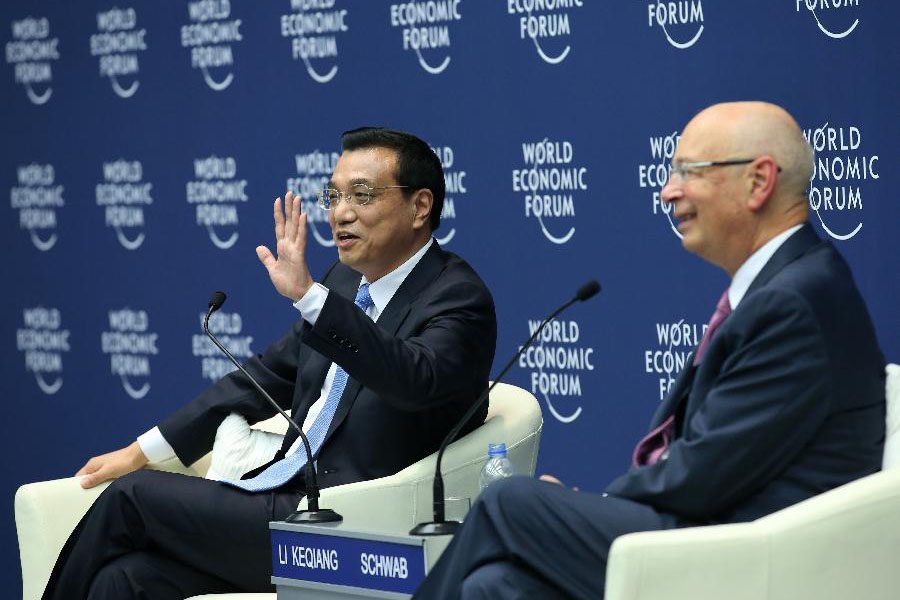
Premier Li Keqiang (L) and executive chairman of the World Economic Forum Klaus Schwab meets Chinese and foreign entrepreneurs in Dalian, Northeast China's Liaoning province, Sept 10, 2013. The Summer Davos, also known as the World Economic Forum Annual Meeting of the New Champions, will be held from Sept 11 to 13 in Dalian. [Photo by Pang Xinglei/Xinhua]
DALIAN — Premier Li Keqiang said on Sept 10 that China will have to rely on reforms to achieve long-term, sustainable and healthy development of its economy, while underscoring future reforms to be carried out in multiple fields.
In response to questions raised by business representatives ahead of the Annual Meeting of the New Champions 2013, also known as Summer Davos, Li said the key to economic reforms is to “balance well the roles of the government, the market and society.”
The government should let the market carry its roles in order to induce more vitality, Li said, adding the nation’s current achievements were due to reforms more than 30 years ago.
The central government has reformed its administrative approval system this year, scrapping or relegating more than 200 approval rights, which were previously held by the government.
The reforms have affected the vested interests by removing the approval rights of many government departments, thus reducing the opportunities for corruption, Li said.
China will also create a fair environment for market competition, letting all kinds of enterprises enjoy the same access to opportunities. Meanwhile, the government will continue to crack down on infringement of intellectual property rights and fraudulence, said the premier.
“Our purpose of reforms is to let more people enjoy the fruits they will bring,” Li said.
The premier said that the nation’s economic reforms inevitably include financial reforms, which China is firmly determined to push forward.
He said that the nation will continue on its path of interest rate marketization after it frees up controls on bank lending rates. China will also diversify its capital market and widen financing channels to allow more direct financing.
The premier said China will further open up its financial sector through measures such as piloting township bank trials.
In the meantime, China will promote the convertibility of the yuan under capital account, introducing “more options” other than the current offshore yuan businesses, he said.
To expand the yuan’s global reach in recent years, the Chinese government has encouraged the use of yuan in cross-border trade and investment settlement in offshore markets such as Hong Kong and London to create more channels for the currency to circulate outside the Chinese mainland.
Li said that Switzerland also expressed desire to develop offshore RMB business during his visit in May.
“I will seriously consider the suggestion. Of course, this should be carried out step by step,” said Li.
In pushing reforms, Li warned, China must guard against financial risks by improving its regulatory regime and make it more scientific and effective.
He said the deposit insurance system is under consideration and once the risk prevention work is well in place, the market-oriented financial reforms will be accelerated.
The Chinese government has attached greater importance to economic restructuring in recent years. Premier Li said that China will unwaveringly stick to a “green path” for development.
Li admitted that some pollution problems in China were a result of extensive development. However, the government will speed up the elimination of outdated production capacities and work harder to develop resource-saving and environmental protection sectors.
He reassured business representatives that China is willing to carry out technological cooperation with them and encourage their participation, adding that China will encourage its own companies to expand operations abroad.
“Foreign firms are always welcome to invest in China,” he said.
In facing a slowing economy, China has stayed calm and taken a more holistic approach, especially stressing the importance of reforms, economic restructuring and market vigor, to boost slowing growth instead of adopting short-term stimulus measures to lift the economy, he said.
“The efforts have gradually paid off,” Li said, citing August’s improving economic indicators including the Purchase Managers’ Index, industrial profits and power consumption.
“I would not deny that we’ll meet various risks and challenges in the future, but we have the courage to stay calm and the wisdom to address the problems,” Li said.
Dr. Hans-Paul Burkner, chairman with the Boston Consulting Group (BCG), who also attended Tuesday’s meeting, said Premier Li is aware of opportunities and challenges.
“The premier is obviously very aware of the various challenges that China faces, but he also is very determined to address them and he sees great opportunities to move forward,” Burkner said, adding: “The clear expectation is that there will be change in the Chinese economy and Chinese society.”
Summer Davos is scheduled to run Sept 11-13 in Dalian, a port city in Northeast China’s Liaoning province.
